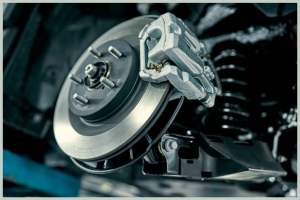 Brakes are essential to enable you to control the speed of your Chevy. The braking system depends on a wide variety of parts, and these parts can suffer wear over time. If your braking system is damaged, this damage can make an accident more likely. As your Chevy dealer, we want to tell you about some of the signs that it’s time to get a brake repair with us.
Brakes are essential to enable you to control the speed of your Chevy. The braking system depends on a wide variety of parts, and these parts can suffer wear over time. If your braking system is damaged, this damage can make an accident more likely. As your Chevy dealer, we want to tell you about some of the signs that it’s time to get a brake repair with us.
Squealing Brakes
Your braking system depends on friction. When you use the brakes, the hydraulic pressure generated by the brake fluid forces the brake calipers to close against the wheel rotors. The calipers contain brake pads, and these pads have a friction material covering. This friction material is forced against the smooth surface of the rotors, which brings the rotors to a stop.
Some of this material wears off each time you apply the brakes. When the material drops to 1/4″ thick, it reveals a metal spike. These metal spikes are installed by the manufacturers and will scrape against the rotors. The scraping produces a high-pitched squealing sound as a reminder that it’s time to change your pads.
Your Car Takes Longer to Stop
When you step on the brake pedal, you expect your brakes to immediately bring your Chevy to a stop. If your brakes are worn, you’ll notice that the braking system takes longer to engage. The slower braking response is gradual, but the longer it takes for your brakes to work, the more dangerous driving will become.
One of the reasons for this delay is wearing on the brake pads. As we saw above, the brake pads slowly wear thinner as the material flakes off. The thinner pads must work harder to generate the necessary friction to stop the rotors. In addition, thinner pads mean the calipers have to move closer to the rotors, and this takes longer. Once we replace the pads, your breaking response will return to normal.
Chemical Smell When You Brake
The brake system is controlled by brake fluid. When you step on the brake, the brake master cylinder releases brake fluid into the hoses. The fluid is pressurized to enable it to force the calipers to close. In time, the pressure and heat generated by the braking system will take their toll on the fluid.
If you smell a strong chemical smell when you brake, the fluid is overheating. If the fluid isn’t changed, it can get hot enough to burn. Burning brake fluid produces a hot acrid smell, and it also loses its hydraulic properties. If the fluid doesn’t generate hydraulic pressure, your brakes won’t work.
If your brakes aren’t working as well as they should, call us ASAP at Brinson Chevrolet.



